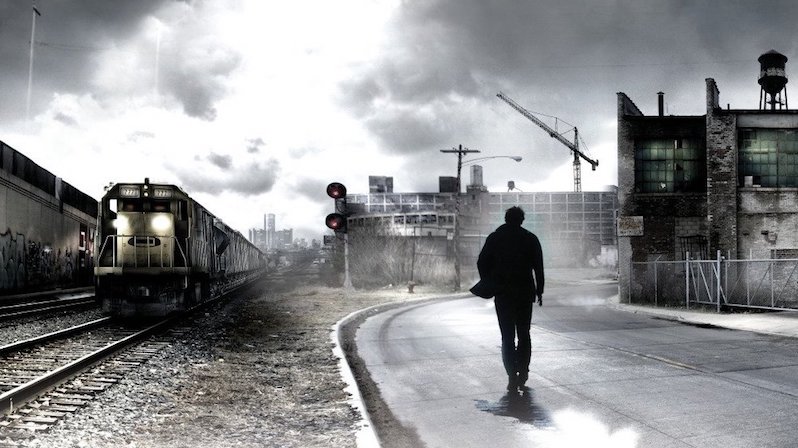
The New York Public Library Young Lions fiction award shortlist includes Lesley Nneka Arimah’s What It Means When a Man Falls from the Sky, Venita Blackburn’s Black Jesus and Other Superheroes, Gabe Habash’s Stephen Florida, Emily Ruskovich’s Idaho, and Jenny Zhang’s Sour Heart. The newly minted $35,000 Aspen Words literary prize goes to Mohsin Hamid for Exit West, with the jurors noting, “Mohsin Hamid’s sentences are exquisite, capable of jaw-dropping surprise, elegant emotional exploration, and bone-chilling horror within a few clauses. And by bringing the contemporary refugee crisis into countries that have mostly ignored the suffering beyond their borders, he forces us to ask ourselves how we are reacting to the crisis, and what potential we have to do better. In a world with 50 million displaced people, this is a novel that affects us all.” Video of the awards ceremony here.
The Man Booker International Prize shortlist includes Han Kang’s The White Book, translated by Deborah Smith, and László Krasznahorkai’s The World Goes On, translated by John Batki, Ottilie Mulzet, and George Szirtes.
Historic book moment: A Higher Loyalty, James Comey’s autobiographical takedown of the current president, sets up a frenzy among critics and journalists eager to break the April 17 embargo. The first substantial reviews appear April 12; former chief book critic of the New York Times Michiko Kakutani is back in action. (“The central themes that Comey returns to throughout this impassioned book are the toxic consequences of lying; and the corrosive effects of choosing loyalty to an individual over truth and the rule of law,” she writes in a review originally slated to run April 22).
Curator Julia van Haaften writes the first biography of “gutsy, brilliant, rebellious, prickly, cantankerous, inventive, indefatiguable” photographer Berenice Abbott, debut short story collection author Nafissa Thompson-Spires uses race as “a plot driver, irony engine, and comic goad in the manner of Paul Beatty,” Pulitzer Prize winning poet Gregory Pardlo writes a father-driven memoir, John Edgar Wideman’s powerful new story collection blends autobiography and fiction in many forms, and Nordic Noir novelist Jo Nesbø reframes Macbeth.
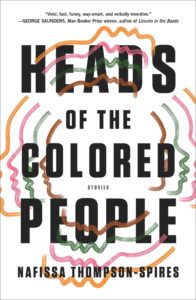
Nafissa Thompson-Spires, Heads of the Colored People
Thompson-Spires’s first story collection is filled with characters who are “onlies”—the only black professor in a small college, the only black girl in school. “It can be a hard role to fill,” she tells NPR’s Audie Cornish, “because you are sort of a representative of what people see as black, by virtue of them not having had much exposure to it, there are all these additional pressures on top of the standard pressures of being black in a white world.”
“The focus on blackness in this debut collection of stories may be the least interesting thing about it,” writes Boris Kachka (Vulture). “Or rather, what’s interesting is the use Thompson-Spires makes of race—as a plot driver, irony engine, and comic goad in the manner of Paul Beatty.”
John Williams (New York Times) writes,
“From the opening sentences of the opening story in Nafissa Thompson-Spires’s debut collection, Heads of the Colored People, we’re in a world of humor, provocation and deep reflection about cultural signifiers: ‘Riley wore blue contact lenses and bleached his hair—which he worked with gel and a blow-dryer and a flatiron some mornings into Sonic the Hedgehog spikes so stiff you could prick your finger on them, and sometimes into a wispy side-swooped bob with long bangs—and he was black. But this wasn’t any kind of self-hatred thing.’ Ms. Thompson-Spires was inspired by James McCune Smith, a 19th-century abolitionist and doctor whose brief stories about various characters were published under the title ‘Heads of the Colored People, Done With a Whitewash Brush.’”
“The power of Heads of the Colored People stems, ultimately, from its author’s command,” writes David Canfield (Entertainment Weekly). “In the book’s first story, she slides into meta-commentary, describing it as a ‘black network narrative’: a portrait of a diverse group of characters linked by gun violence—by a murder. It’s upsetting as none of the other stories are, a sharp pain manifested out of the trauma of history which sinks into the rest of the book. Even at Heads’ most low-key, that shock is there, lingering.”
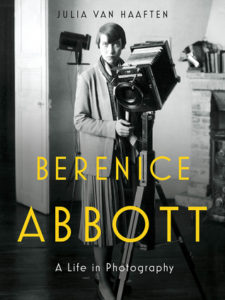
Julia Van Haaften, Berenice Abbott
The first curator of the New York Public Library’s photography collection immortalizes a pioneering modernist photographer whose work spanned six decades.
Ann Levin (The Associated Press) leads off: “The word gutsy doesn’t even begin to describe the great 20th-century photographer Berenice Abbott. Nor does brilliant, rebellious, prickly, cantankerous, inventive or indefatigable. Taken together, however, they convey something of the spirit of a woman born in 1898 but always ahead of her time.”
“Abbott led a large, unconventional and sometimes wild life, and it’s astonishing—a better word might be maddening—that Julia Van Haaften’s …is the first full-dress biography we have of her,” notes Dwight Garner (New York Times).
The Publishers’ Weekly review concludes: “Van Haaften explores in detail Abbott’s lifelong pursuit of the money and recognition she deserved, but which proved particularly elusive due to her gender and sexuality. The result is a full and nuanced portrait of a complicated, hardworking, and creatively brilliant artist.”
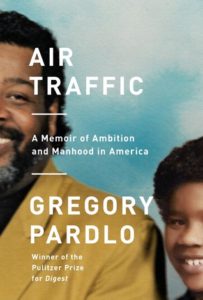
Gregory Pardlo, Air Traffic
The Pulitzer Prize winning poet takes to memoir, infusing the essay form with indelible images.
“The essays in Air Traffic…function like someone who jumps up from sleep, thinking the nightmare is over, only to discover this is reality,” writes Yahdon Israel (Poets & Writers). “Pardlo’s rendering of his life and the people in it takes on a quiet nobility because the author resists the temptation to achieve any simple resolutions. There are no grand statements to be made. No fortune cookie wisdom. No moral to the story. If Greg Sr. was driven to death by the promise of the Hollywood ending, Pardlo is in the parking lot of life doing donuts. This is where Air Traffic succeeds.”
Nick Ripatrazone (The Millions) notes, “I like when poets write prose. Air Traffic…is a masterful consideration of manhood in contemporary America: the lies we tell ourselves, the struggle to find our own identity in the shadow of fathers, and the sweet perils of ambition.”
Thomas Beller (4Columns) praises Pardlo Jr.’s style—“the syntax and thought process sinuous, elegant, the mood one of blunt disclosure. Writing from the vantage of middle age and fatherhood, he sees the giants of his youth, such as his father and grandfather, not through the awestruck eyes of a child, but in the context of history. The historian’s cool eye is the weapon with which he fights off the eulogist’s impulse to valorize his subjects. (He is also circumspect about the Pulitzer Prize he won for his 2014 poetry collection, Digest.) Of his maternal grandfather, among the first black air traffic controllers, he writes, ‘he was no superhero. His story is most unremarkable . . .’ He points out that ‘before President Woodrow Wilson made segregation the law of the land, federal jobs supported many middle-class black families.’”
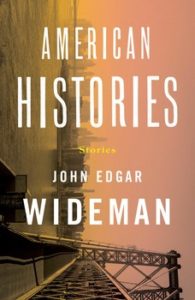
John Edgar Wideman, American Histories
Wideman’s new story collection focuses on racial issues from the times of John Brown and Frederick Douglass to the present, and includes stories that touch upon his family. How does he work through his own painful personal stories? NPR’s Robin Young asks. “I’m coping. Coping with history, coping with what it means to be alive. How do you talk about the Holocaust? How do you talk about slavery? Probably the best thing to do is just be quiet and hide from it, forget about it. Except, then it jumps up and bites you. Because it’s there.”
In American Histories, Wideman “continues to ask questions about race, writing, and society, and does so in the most stylistically diverse volume of his career,” writes Daniel J. Kubis (Pittsburgh Post-Gazette). “The result is an important addition to Mr. Wideman’s body of writing and a remarkable demonstration of his ability to address social issues through a range of fictional forms and styles.”
The starred Kirkus review notes, “Wideman’s recent work strides into the gap between fiction and nonfiction as a means of disclosing hard, painful, and necessary truths.”
Martha Southgate (New York Times Book Review) concludes, “I found the digressiveness of this collection frustrating at times — it’s not a likable or easily accessible book. But in this case, that’s not a criticism. American Histories is not here to be liked. It’s here to challenge you. And that it does.”
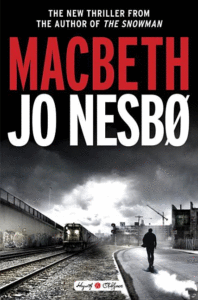
Jo Nesbø, Macbeth
Nordic Noir novelist Nesbø takes on Shakespeare in the latest installment in the Hogarth series.
“Nesbo’s Macbeth is the latest entry in a project in which top-flight novelists are asked to reinterpret Shakespeare,” writes Dennis Drabelle (Washington Post). “Already published are Jeanette Winterson’s The Winter’s Tale (retitled The Gap of Time), Howard Jacobson’s The Merchant of Venice (Shylock Is My Name), Anne Tyler’s The Taming of the Shrew (Vinegar Girl), Margaret Atwood’s The Tempest (Hag-seed), Tracy Chevalier’s Othello (New Boy) and Edward St. Aubyn’s King Lear (Dunbar). This is heady company for a crime novelist to join, but Nesbø has repaid what may have been a wild hunch on the part of his publisher.
“We now have a Macbeth by the king of Scandi-noir crime, Jo Nesbø,” writes Steven Poole (The Guardian). “It turns out to be rather an inspired choice: the bloody tragedy of political ambition translates well to a corrupt police department in a lawless town, where the cops are just one more armed gang.”
Bethanne Patrick (NPR) concludes, “Nesbo has adhered to his contract, delivering a book that plays off of Shakespeare’s work but succeeds as his own. Will readers love it or hate it? That depends on why they read it. Shakespeare buffs may want to keep the book at arm’s length, while Nesbø followers will devour it in one sitting, despite the 500-page length.”
If you buy books linked on our site, Lit Hub may earn a commission from Bookshop.org, whose fees support independent bookstores.

